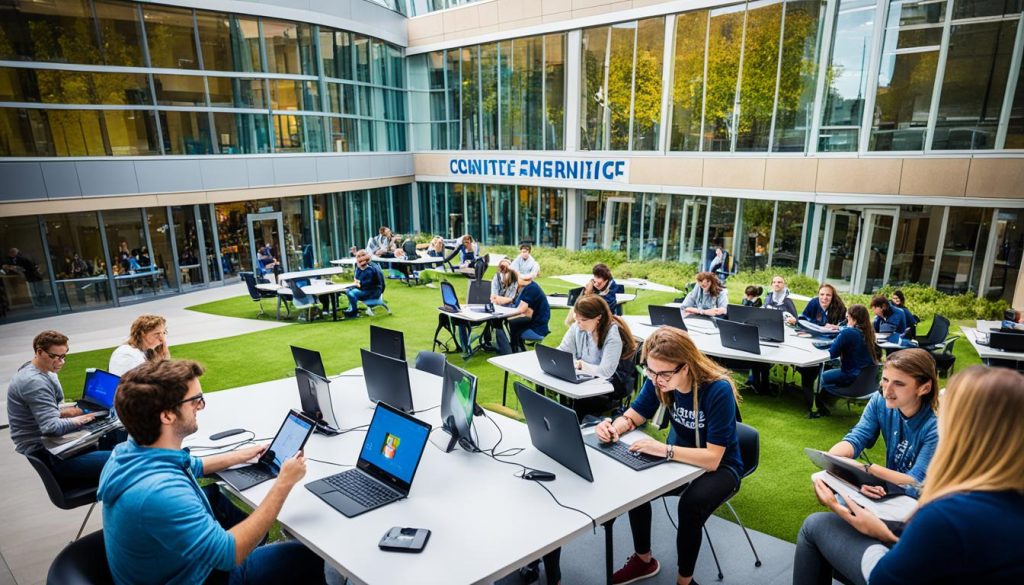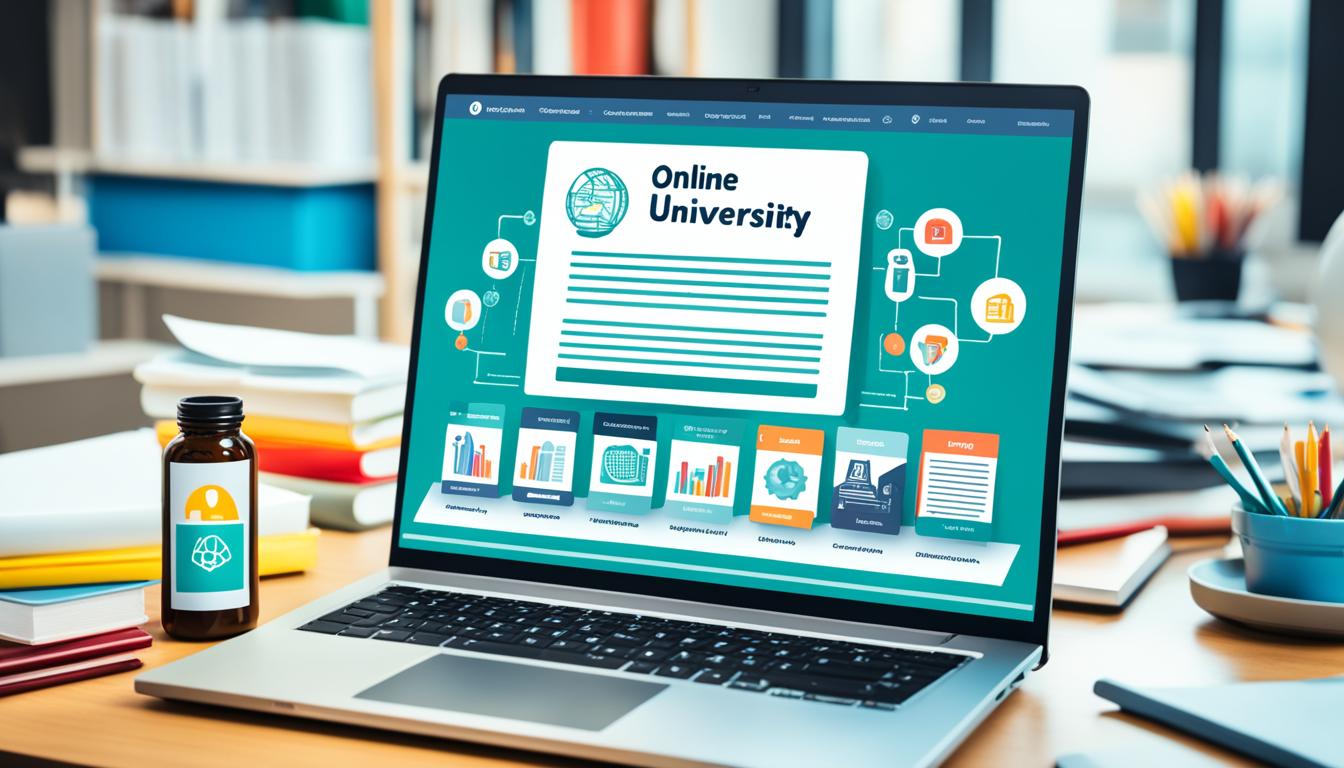Empowering Education if the Transformative Potential of Online Universities in Todays World
Online learning, facilitated by online universities, has emerged as a transformative force in education. With the advent of virtual higher education institutions and internet-based degree programs, students now have the opportunity to access high-quality education from anywhere, breaking down the barriers of physical limitations and time restrictions.
Gone are the days when pursuing a degree meant being confined to a campus. The internet has ushered in a new era where students can study at their own pace and in their own environments. Whether it’s earning a bachelor’s or master’s degree or acquiring new skills through digital university courses, online learning offers unparalleled convenience and flexibility.
Unlike traditional brick-and-mortar institutions, online universities provide a web-based learning platform that democratizes education. This accessibility makes higher education attainable for people of all backgrounds and socioeconomic classes. The digitization of education empowers individuals by offering a wide range of academic sources and enhancing inclusivity in the educational landscape.
The quality of online learning is ensured through the use of advanced technologies, pedagogical theories, and support mechanisms for both learners and teachers. Online universities are at the forefront of implementing innovative strategies to deliver personalized, engaging, and effective education.
By embracing online universities and their internet-based degree programs, we can unlock the full potential of education and empower learners around the world.
Key Takeaways:
- Online universities provide accessible and flexible education through web-based platforms.
- Internet-based degree programs break down physical and time limitations, allowing students to study at their own pace.
- Online learning democratizes education, making it accessible to people of all backgrounds and socioeconomic classes.
- Advanced technologies and support mechanisms ensure the quality of online education.
- Online universities empower learners by offering personalized and engaging learning experiences.
The Power of Online Universities in Enhancing Access to Education
Online universities have emerged as transformative platforms that significantly enhance access to education. With the rise of virtual higher education institutions and internet-based degree programs, individuals who face physical limitations or other constraints can now easily pursue their educational goals. These online platforms offer a wealth of opportunities for students from diverse backgrounds, ensuring that location is no longer a barrier to acquiring knowledge.
Through online universities, students can access a wide range of courses, subjects, and disciplines. Regardless of their geographical location, individuals can enroll in programs offered by reputable institutions from around the world. This availability of education expertise unites a global community of learners, fostering inclusiveness and diversity within the educational system.
One of the key advantages of online universities is the flexibility they provide. Students can engage in self-paced learning, allowing them to tailor their studies to fit their individual schedules and preferences. Whether they choose to study during traditional working hours or late at night, the internet-based nature of these programs ensures that education is accessible to all, regardless of their other commitments.
This flexibility not only benefits working professionals but also empowers individuals who may face financial or time constraints that prevent them from attending traditional brick-and-mortar institutions. Online universities offer an affordable and convenient solution, enabling students to pursue their educational aspirations without compromising their other responsibilities.
“Online learning is the key to unlocking education for individuals who may have previously felt excluded or limited in their options,” says Dr. Emily Johnson, a renowned expert in online education. “These internet-based degree programs provide a gateway to higher education and empower individuals to advance their careers and improve their lives.”
“The online format offers the flexibility I need to balance my studies with my work and family commitments,” shares Sarah Davis, a student at an online university. “Without this option, I wouldn’t have been able to pursue my degree while still fulfilling my other responsibilities.”
Furthermore, online universities play a crucial role in promoting social advancements and economic empowerment. By breaking down barriers to education, they give individuals the tools and knowledge necessary to excel in their chosen fields. This, in turn, leads to increased career opportunities and economic growth, both at the individual and societal levels.
As the popularity of online education continues to grow, so does the potential for online universities to reshape the educational landscape. Through their commitment to inclusivity, flexibility, and accessibility, virtual higher education institutions are ensuring that education is no longer confined to traditional settings.
Table 1: Advantages of Online Universities in Enhancing Access to Education
| Advantages | Description |
|---|---|
| Geographical Accessibility | Students can enroll in online programs regardless of their location, breaking down barriers to education. |
| Flexible Learning | The online format allows students to study at their own convenience, accommodating their individual schedules. |
| Affordability | Online universities offer cost-effective alternatives to traditional higher education, making education accessible to a wider audience. |
| Inclusivity | Online education ensures that individuals who face physical limitations or other constraints can still pursue their educational goals. |
| Empowerment | By providing accessible education, online universities empower individuals and contribute to social advancements and economic growth. |
Enabling Educational Accessibility for All
The power of online universities lies in their ability to eliminate barriers and enable educational accessibility for all. By offering courses, programs, and degrees through internet-based platforms, these institutions are empowering individuals to pursue their dreams, no matter their circumstances. Whether it’s a working professional looking to upskill, a stay-at-home parent seeking to further their education, or an individual in a remote location with limited access to traditional institutions, online universities are changing lives by making education a possibility for everyone.
Personalized Learning and Collaboration in Online University Settings
When it comes to online universities, one of the key benefits is the ability to provide personalized learning experiences tailored to individual student needs. Through advanced technologies and adaptive learning systems, online platforms can analyze students’ progress, identifying knowledge and skill gaps, and offering targeted recommendations for improvement. This personalized approach, combined with the guidance of dedicated instructors, allows students to maximize their academic potential and foster personal growth.
Additionally, online learning platforms create a seamless environment for collaboration and communication among students, teachers, and parents. Discussion forums, video conferencing tools, and interactive online platforms serve as virtual classrooms, enabling students to connect and engage in collaborative projects. Through these collaborative efforts, students develop teamwork and critical thinking skills while leveraging the diversity of perspectives within the online community.
Educators play a vital role in this collaborative setting by tracking student progress and providing timely feedback. By closely monitoring student performance, instructors can identify areas of improvement, offer guidance, and strengthen the teacher-student relationship. These supportive interactions create a nurturing learning community and encourage students to actively participate in their educational journey.
| Benefits of Personalized Learning and Collaboration in Online University Settings: |
|---|
| 1. Customized learning experiences catered to individual student needs. |
| 2. Adaptive learning systems identify knowledge and skill gaps. |
| 3. Targeted recommendations for improvement maximize academic potential. |
| 4. Collaboration fosters teamwork and critical thinking skills. |
| 5. Online platforms serve as virtual classrooms for seamless communication. |
| 6. Educators track student progress and provide timely feedback. |
With personalized learning and collaboration as integral components, online universities create a dynamic and engaging learning environment that enhances the overall educational experience.

Testimonial: Sarah Thompson, Online Student
“Online learning has truly transformed my educational journey. The personalized learning experience has allowed me to focus on my strengths and areas of improvement, pushing me to reach new heights academically. Collaborating with fellow students from different backgrounds has broadened my perspectives and taught me valuable teamwork skills. I feel fully supported by my instructors, who provide timely feedback and guidance. Online universities have opened doors I never thought possible.”
Expanding Learning Opportunities and Developing Future-Ready Skills
Online universities provide students with a plethora of learning opportunities that extend beyond the confines of traditional classroom settings. Through the use of virtual field trips, interactive simulations, and multimedia content, students are able to explore diverse subjects and gain specialized knowledge.
One of the key advantages of online courses and distance learning programs is the ability for students to expand their horizons and learn beyond the limitations of their physical schools. With the click of a button, students can access a vast array of educational resources and engage with materials that were once geographically out of reach.
Moreover, online learning equips students with the essential 21st-century skills they need to thrive in today’s digital world. As they navigate web-based learning platforms, students develop digital literacy, communication abilities, creativity, critical thinking, and problem-solving skills.
By fostering the development of these future-ready skills, online universities empower students to become competent digital citizens who can navigate the digital landscape responsibly and effectively. They learn to analyze information critically, communicate their ideas clearly, and collaborate with others in virtual environments.
Benefits of Expanding Learning Opportunities and Developing Future-Ready Skills
“Online universities offer students a world of possibilities beyond the traditional classroom. Through interactive learning experiences and the development of future-ready skills, students are better prepared for success in the digital age.”
By capitalizing on the flexibility and expansive nature of online education, students are able to pursue their passions and delve into subjects they may not have otherwise had access to. This not only broadens their knowledge base but also enhances their overall academic experience.
Table: Skills Developed Through Online Learning
| Skills | Description |
|---|---|
| Digital Literacy | Proficiency in navigating digital platforms, media, and technology. |
| Communication | Effective and clear expression of ideas in virtual environments. |
| Creativity | The ability to think outside the box and generate innovative solutions. |
| Critical Thinking | Analysis, interpretation, and evaluation of information in a digital context. |
| Problem-Solving | The application of logical reasoning to overcome challenges and find solutions. |

The expansion of learning opportunities and the development of future-ready skills through online universities have a transformative impact on students’ educational journey. These skills not only prepare them for success in the digital age but also empower them to become active participants in an increasingly interconnected world.
Conclusion
The rise of online universities has brought about a remarkable transformation in the field of education. These virtual higher education institutions have revolutionized the learning experience by providing unparalleled access to high-quality education, irrespective of physical boundaries and time constraints. With internet-based degree programs and digital university courses, online universities have created a web-based learning platform that offers flexibility and personalized learning opportunities to cater to the diverse needs of students.
One of the key advantages of online universities is the promotion of collaboration and communication among students, teachers, and parents. Through discussion forums and video conferencing tools, students can engage in collaborative projects, developing teamwork skills and critical thinking abilities. Moreover, online learning platforms enable educators to track student progress and provide timely feedback, fostering a supportive learning community.
Online universities also play a crucial role in expanding learning opportunities beyond traditional classroom settings. Through virtual field trips and interactive simulations, students can explore a wide range of subjects and acquire specialized knowledge. Additionally, these web-based learning platforms equip students with essential 21st-century skills, such as digital literacy and problem-solving, preparing them to thrive in the digital age.
While online universities offer immense potential for education, ensuring their success requires the integration of advanced technologies, continuous teacher training, and a commitment to quality improvement. By embracing these factors, online universities can reshape the educational landscape and create a future of flexible, accessible learning for all.
FAQ
What is an online university?
An online university is a virtual higher education institution that offers internet-based degree programs and digital university courses. It provides a web-based learning platform for students to access education remotely.
How does an online university enhance access to education?
Online universities break down barriers to education by allowing students to access a wide range of courses and disciplines regardless of their location or background. It provides an opportunity for those who are unable to attend traditional brick-and-mortar institutions due to physical limitations or other constraints.
What are the benefits of personalized learning in online university settings?
Online universities offer personalized learning experiences that cater to individual student needs. Through adaptive learning systems, students can receive targeted recommendations to address knowledge and skill gaps, maximizing their academic potential.
How do online universities promote collaboration and communication?
Online learning platforms facilitate seamless collaboration and communication among students, teachers, and parents. Discussion forums, video conferencing tools, and online platforms enable students to connect and engage in collaborative projects, fostering teamwork and critical thinking.
How do online universities expand learning opportunities?
Online universities go beyond traditional classroom settings by offering virtual field trips, interactive simulations, and multimedia content. This allows students to explore diverse subjects and acquire specialized knowledge, expanding their horizons of education.
What skills can students develop through online universities?
Online learning equips students with essential 21st-century skills such as digital literacy, communication, creativity, critical thinking, and problem-solving. It prepares them to be competent digital citizens and navigate the digital world responsibly and effectively.
Source Links
- http://www.gesseducation.com/gess-talks/articles/empowering-education-through-edtech-transforming-schools-and-enhancing-student-learning
- https://www.linkedin.com/pulse/empowering-education-unveiling-potential-online-learning-shekhar-a8frf
- https://www.linkedin.com/pulse/empowering-digital-transformation-higher-education-role
